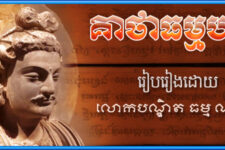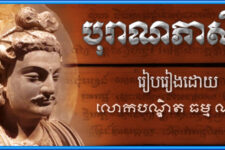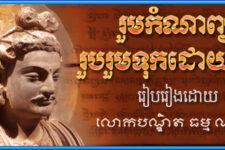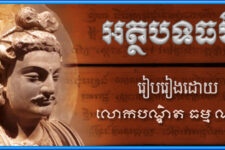ពុទ្ធវចនៈក្នុងធម្មបទ គាថាទី ៣១
THE HEEDFULL ADVANCE
аббамаад̣̇арад̇о бхигку, бамаад̣̇з бхаяад̣̇асси ваа;
сам̣яож̇анам̣ ан̣ум̣ т̇уулам̣, д̣ахам̣ аг̇г̇ийва г̇ажчад̇и.
(ខាងលើនេះជាភាសាបាលីតួអក្សរ Cyrillic អានដូចភាសាបាលីតួអក្សរខ្មែរខាងក្រោមនេះ ខ្ញុំមិនចេះអានទេ គ្រាន់តែយកមកបង្ហាញឱ្យមើលលេងប៉ុណ្ណោះ ។ តួអក្សរ Cyrillic នេះជាតួអក្សរមួយដែលប្រើច្រើនជាប់លំដាប់ទី ៥ ក្នុងលោក មកដល់ឆ្នាំ ២០១១ មនុស្សប្រមាណ ២៥២ លាននាក់ប្រើតួអក្សរនេះសរសេរភាសាផ្លូវការរបស់ខ្លួន ដែល ៥០% ជាជនជាតិរុស្សី)
អប្បមាទរតោ ភិក្ខុ, បមាទេ ភយទស្សិ វា;
សំយោជនំ អណុំ ថូលំ, ឌហំ អគ្គីវ គច្ឆតិ ។
ភិក្ខុត្រេកអរក្នុងសេចក្ដីមិនប្រមាទ ឃើញភ័យក្នុងសេចក្ដីប្រមាទ
រមែងដុតចំណងកិលេសតូចធំបាន ដូចភ្លើងឆេះកំទេចតូចធំដូច្នោះ ។
The Bikkhu(1) who delights in heedfulness, and looks with fear on heedlessness, advances like fire, burning all fetters(2) great and small.
——————————————-
Story
A monk, failing in his meditation in the forest, was coming to see the Buddha. On the way he saw a forest fire advancing, burning all things great and small. This sight induces him to think that he too should advance burning all the fetters, great and small, by the fire of Noble Eightfold Path. The Buddha reads his thought and, radiating a ray of light, advised him accorgingly.
————————————
(1) A fully ordained disciple of the Buddha is called a Bhikkhu. “Medicant monk” may be suggested as the closest equivalent for “Bhikkhu”. He is not a priest as he is not mediator between God and man. He has no vows for life, but he is bound by his rules which he takes of his own accord. He leads a life of voluntary poverty and celibacy. If he is unable to live the Holy Life. He can discard the robe at any time.
(2) Saṁyojana–lit., that which yokes beings to the ocean of life. There are ten kinds of fetters- namely, self-illusion (sakkāyadiṭṭhi), doubts (vicikicchā), indulgence in (wrongful) rites and ceremonies (silabbataparāmāsa), sense-desires (Kāmarāga), hatred (paṭigha), attachment to the Realms of Form (rūparāga), attachment to the Formless Reals (arūparāga), conceit (māna), restlessness (uddhacca) and ignorance (avijjā).
The first five, pertaining to This Shore (orambhāgiya) are regarded as small, the rest, pertaining to Further Shore (uddhambhāgiya) as great.
The first three are eradicated on attaining the first stage of Sainthood (Sotāpanna).
The second two are attenuated on attaining the second stage of Sainthood (Sakadāgāmi).
The second two are destroyed on attaining the third stage of Sainthood (Anāgāmi).
The last five are eradicated on attaining the fourth stage of Sainthood (Arahanta).
————————————-
Source: Dhammapada: Appamāda Vagga; translated by Nārada Thera.
ប្រែពីបាឡីជាភាសាខ្មែរដោយ តាអារាមប៊យ
ខែកញ្ញា ២៧, ២០១៩


🔸កំណែចុងក្រោយ Last Updated on February 24, 2025 by Johnny ចន្នី



